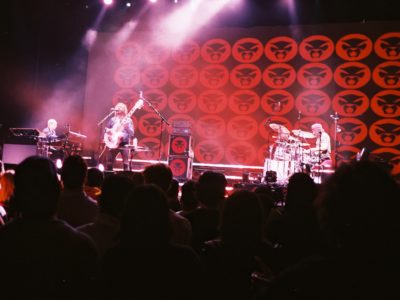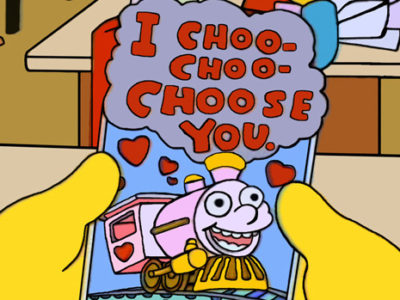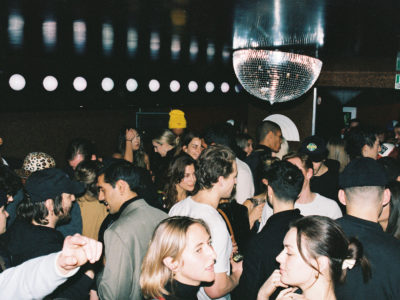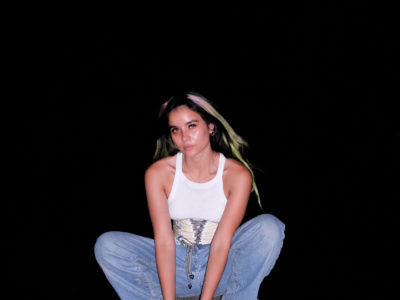
Young Music Video Directors Tell All
Young Music Video Directors Tell All
WRITTEN BY: ARIELA KOZIN | REPORTING BY: SARAH HURLEY
Despite dire predictions of their demise, music videos remain an integral way for artists to project their vision. What we don’t see, however, while watching Lemonade or “HUMBLE.,” are the hours of work, the treatments, brainstorms, and editing, that go into making those few minutes of magic.
Of course, the director is of utmost importance, at the center of the production. The best videos are a mix of both their ideas and those of the artist they’re working with (obviously artists have a lot of ideas, without necessarily having the know how of how to execute them). They’re responsible for guiding the talent, whether it be children, animals, or scantily dressed dancers, and also the crew.
It’s a mammoth task, and takes a special kind of creative. Here, we talk to the four directors we believe to be the David Finchers or Spike Jonzes of tomorrow–introducing Ryan Staake, Sasha Rainbow, Josh Goldenberg aka “Glassface,” and Lacey Duke.
Josh Goldenberg aka "Glassface"

Josh Goldenberg, who works under the Moniker “Glassface“, has social media to thank for his latest video. After transitioning from a graphic designer into a director for artists like Ab-Soul, none other than Lil Yachty reached out to him via Twitter. Since that viral, effect-happy video for “1 NIGHT,” his portfolio has erupted—having since directed for Dua Lipa and Khalid.
Was there a defining moment in your life where you knew you needed to be a director?
Hard to define one moment. I’ve always been a really visual person. I lead kind of a winding path through visual arts, initially was more focused on graphic design, and decided I wanted to work more with video/vfx/animation. Fused with my love for music, it was kind of natural to bring everything together and start shooting music videos.
Can you tell us a bit about your first paid job as a director?
I think Tobi Lou was the first person who really paid me to direct a music video—back when he went by a different name. We went all out with it. CGI mixed with live performances, a 3-D batmobile, 2-D animation, etc. That video no longer exists though.
Can you walk us through your creative process when you sign on to direct a music video?
Step 1 is listening to the music. If it’s not someone I know, then researching the artist and immersing myself in their world. It’s really important to me that I not only bring my vision, but I bring value and elevate the artist’s vision and song. Step 2 is writing a treatment breaking down the idea and giving an idea of the vision I’d aim to execute (although I also love improvising and doing more off-the-cuff ideas. Step 3 is make art and have fun. I tend to explore the most on the post side—there’s an infinite number of ways you can make something more visually arresting, or more fitting to the music.
What is the greatest challenge you face throughout the production of a project? How do you overcome it?
It takes a lot of people and work to put the pieces in place for a production. I started out doing everything from pre to post, and that’s a good way to spread yourself thin and not nail a vision. I think you overcome it by being able to build teams and trust collaboration as a way to achieve bigger better versions of the vision.
There are so many people who would love to be in your place career-wise. What do you think separates the top music video directors from the rest?
I don’t feel like I’m where I want to be yet. I think the drive to keep hitting bigger goals, learn new techniques, explore different ideas and elevate what you’re able to do, are some of the elements key to separating yourself from the rest. I never want to be complacent with where I am career-wise, my motives are focused on continually getting better. I think that helps. I see a lot of people who want to be on the “scene” more than they want to make good art. I have two goals—make better art, and make more money to put back into that art. If I’m lucky, I’ll leave a legacy—and I’ll do that not only in music video, but in other realms of visual art, in music, product design, commercials, TV and film.
Dream artist to direct a music video for?
Destiny’s Child.
Lacey Duke

Lacey Duke is one of the few women of color making their mark as a music video director, in a field still, for the most part, dominated by men. She’s taken her signature playful, tongue-in-cheek aesthetic to create music video magic for D.R.A.M., Janelle Monae, and Esperanza Spaulding.
Was there a defining moment in your life where you knew you wanted to be a director?
I didn’t really know what it meant to be a director when I was a kid. I used to record anything that was visually interesting to me on VHS just so I could rewatch my favorite moments on TV. I loved music, so I recorded a lot of music videos. I remember recording Missy Elliott’s “The Rain.” I watched it over and over again—I played it for my friends, family, I even played it at school.
I knew I was obsessed with the video but I didn’t know that there was a person responsible for creating the visuals, the ideas, etc. One day my mom’s friend randomly gave me boxes of her old Vibe and Source magazines. I literally sat in the middle of my bedroom and read every single one. I discovered Hype Williams in a magazine article. At that point I was very intrigued by the idea of being a director. I discovered Director X in an article too, that was kind of the turning point for me. X was a young black director from Canada that was doing a lot of the cool shit that I loved. He made me realize that I could actually be a director.
Can you tell us a bit about your first paid job as a director?
I made a few hundred dollars but I was happy because up until that point I had shot several videos for free, some I even paid for myself. So it was a refreshing change haha. I directed, edited and produced the video. I spent a lot of time on it and I thought it was decent. Unfortunately, the artist decided not to release his album and single so the video never came out.
As a director you never really get the chance to practice and fail, you’re kind of just always doing your job from the beginning and you’re expected to deliver every single time. So I thought the experience was valuable, I learned a lot and I didn’t have to pay to learn for once, so it was cool.
Can you walk us through your creative process when you sign on to direct a music video?
Well I don’t usually get signed on to do a video without pitching first. Most of my time isn’t actually spent directing, it’s spent writing treatments. When I’m awarded a video I basically oversee every aspect of it, the concept itself but also art direction, locations, color schemes, the action etc. I do shot lists and moodboards, I pick a cinematographer and send looks to glam and wardrobe.
I put my hands on basically everything, that’s the job. After we shoot I spend a great deal of time in post usually. Sometimes I edit, sometimes I don’t. After the edit is approved, we color, do graphics and retouching if needed, and then we deliver. The entire process can take between 2 weeks to several months depending on the project.
What is the greatest challenge you face throughout the production of a project? How do you overcome it?
Not having enough money is always the greatest challenge. I never have enough money to get my ideas out and I haven’t actually overcome that. I just sort of accept the fact that that my budget is small and then I complain about it from time to time. Then I vow to never work on a low budget video again, but then of course I do and the vicious cycle continues haha.
There are so many people who would love to be in your place career-wise. What do you think separates great music video directors from the rest?
Well I’m certainly not a top music video director so I’m not entirely sure. I’d say opportunity, talent and great ideas. In my opinion top directors really only become top directors the moment they work with top artists. But again to get there you need the opportunity, you need to already have the chops and, of course, you have to have a great idea.
Ryan Staake

Ryan Staake has had a really good year—and it’s because Young Thug didn’t show up to set. Instead of the original $100,000 concept for “Wyclef Jean” revolving around cars, ladies, and mansions, Ryan went ahead and told the ridiculous tale about how it all fell apart. The surprising stunt won him a Video Music Award. Besides his indirect work with Thug, Ryan’s also directed videos for ScHoolboy Q and Major Lazer.
Was there a defining moment in your life where you knew you needed to be a director?
It happened pretty organically. I transitioned from design into making animations and videos and realized “Oh, I guess I can call myself a director now?”
Can you tell us a bit about your first paid job as a director?
It was a music video for Congorock called “Babylon,” funded by an initiative from the car company Scion, called Scion AV. This was probably like 2009 or 2010. I had this idea to have a bunch of hooded figures running around the woods, in this pseudo-pagan ritual involving a gold, shimmering pyramid. No real story to it. I shot the first day and completely blew it with tons of over-exposed footage. Really, just garbage. I then pulled in a couple experienced collaborators for a second day, TS Pfeffer and Rob McHugh, and they saved me. They taught me tons of valuable filmmaking knowledge when I was starting out. I came from a graphic design & motion graphics background, so live action filmmaking was still very new to me at that point.
Can you walk us through your creative process when you sign on to direct a music video?
Normally, I listen to the track a few times. On rare occasions, I’ll get the nugget of an idea right off the bat, and then kind of expand it from there, finding interesting ways to evolve it. If I don’t get an idea early on, I tend to run and listen to the track on repeat—something about getting my blood pumping and exercise makes my mind loosen up and think about ideas a bit more quickly.
I would say in general my ideas tend to be based around some visual or thematic hook that I try to use to tell a story in a new or unexpected way. I get bored with a single style or approach very quickly, so I always feel the need to do something different on every project to keep myself engaged. The drawback to this is that every project I do almost always has a component of “Am I going to be able to pull this off?” but I suppose it’s that way for all creators in a way.
What is the greatest challenge you face throughout the production of a project? How do you overcome it?
Knowing when to listen to the voice in your head telling you “You should really shoot one more take/angle” and when to tell that voice to shut the fuck up so you can move on to the rest of the day.
There are so many people who would love to be in your place career-wise. What do you think separates the top music video directors from the rest?
I think good music video directors learn to ideate fast, plan even faster and execute with a high degree of improvisation—or die trying. We’re a weird breed, and we keep doing this despite the bullshit and hardships because at the end of the day we love music, we love film, and find something magical in the act of tying the two together. Personally, I love the idea of contributing to a lineage of audio-visual artifacts that connect to a time and place in human culture…Dire Straits’ “Money for Nothing,” A Ha’s “Take on Me,” Nirvana’s “Smells Like Teen Spirit,” 2Pac & Dre’s “California Love,” White Stripes’ “Fell In Love With a Girl,” Beyoncé’s “Single Ladies,” just these classics that are like totem poles of the era in which they were made. Striving to have someone remember at least one of my videos as intimately as I remember those videos is what makes me keep shooting music videos.
Dream artist to direct a music video for?
Beyoncé.
Sasha Rainbow

Sasha Rainbow is a special force thanks to her uniquely powerful storytelling and unique point of view. Of course we love fast cars and elaborate dance sequences, but Sasha uses her videos to spread poignant messages about our global community. For example, for Wild Beasts’ “Alpha Female,” Sasha took us to observe the badass women of India, and for Placebo’s “Life’s What You Make It,” she brought us to Ghana to examine environmental waste.
Was there a defining moment in your life where you knew you needed to be a director?
The defining moment in my life when I knew I wanted to be a director was when I was one. I had hustled my way through several creative jobs, never quite enjoying them: Fashion styling, set design, make up, photography. None of it seemed to click. Then, as a stylist and art director, I started to storyboard photo shoots, which started to turn into fashion films, but I never got the credit for any of my ideas since I wasn’t the one holding the camera.
It wasn’t until one day, my ex-boyfriend who was a musician, decided he wanted a music video. We made it on a shoestring budget of £100 pounds and soon after he was signed to Universal on a pretty hefty deal. The next thing I knew, I was being given £15,000 to direct his next video. I was over the moon, but also shitting myself—who said, “Action,” who says, “Cut?” I spent night after night watching as many documentaries on filmmakers as I could get my hands on.
When the day came, I was so nervous. A crew of 20 film professionals—a dolly, not a shopping trolley? I pushed through the first moments but was buzzing by the end of the day. I realised that I had been a director in all my previous roles before, but hadn’t known it. It bridged all my interests into one role, story, character, costume, set design, lighting—and after that I didn’t look back.
Can you walk us through your creative process when you sign on to direct a music video?
Well by the time you have signed on to direct a music video, the creative process has been most likely squeezed out of you at a rapid rate during the pitching phase, then it’s normally hardcore production and problem solving. But basically, if my idea has won, I will then go into more detail. I’ll listen to the song, and with a piece of paper in hand, start writing down the shots I envision.
After that, I will procrastinate for ages then start to sketch a storyboard. It’s something that really helps me delve into my imagination but I find the hardest to start. When that’s happened I’ll get together with my team and talk through everything so we can start to plan and break it down practically.
What is the greatest challenge you face throughout the production of a project? How do you overcome it?
That is one tough question! The greatest challenge changes every time, which is why I think we keep throwing ourselves back into the fire-y pit of problems. Directing is essentially having ideas, then problem solving how to execute them. I think the hardest thing I’ve ever faced is when you’re on set and don’t click with one of your key team. Teamwork is essential for creating something incredible and you can’t always control how other people behave or feel.
There are so many people who would love to be in your place career-wise. What do you think separates the top music video directors from the rest?
Well I’m flattered, but not sure I have an answer. Perhaps one of my favourite quotes will suffice—”The path to success is paved with dead bodies, but most of them are suicides.” It has taken me a good 4 years of practicing to feel I have found my voice, and I think I’m only at the beginning of my career. The biggest step for me was starting to work with ideas that were true to me as a person. I think the top directors are true to themselves and don’t compromise on their vision, which is hard to do when you’re trying to pay rent!
Dream artist to direct a music video for?
Someone truly willing to bear their soul, that lives their song. Let me know if you have any suggestions.





